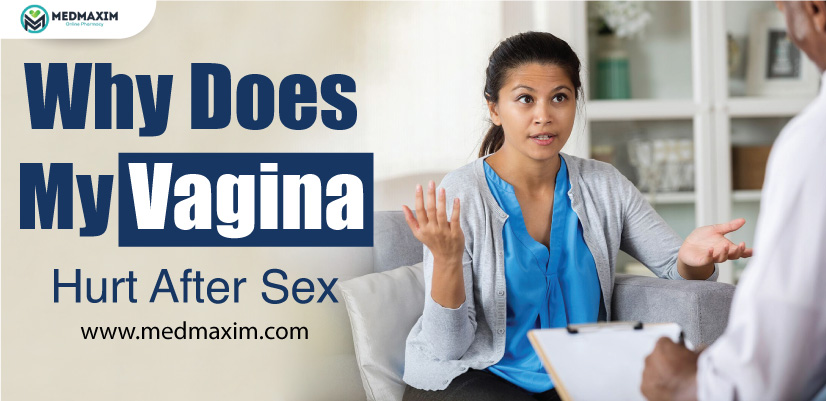The vagina or birth canal is a sensitive area of the female body and most of us think that it is just vital for human reproduction and plays a huge part in sexual satisfaction. But there is so much more to the vagina than many of us even realize.
The muscles of the vagina are elastic and quite flexible which is capable of receiving the penile during sexual penetration and it also serves as a conduit for menstrual flow from the uterus. It allows the baby to pass during childbirth, hence the name birth canal.
When the term vagina comes to your mind you might think of it as a collective part of the female reproductive system. But, you are mistaken because the vagina is a specific organ of the female reproductive system. It is a tube that runs from the vulva to the cervix. In addition, the vulva refers to the external female genitalia which includes the labia and clitoris.
Pain During Sexual Intercourse
Many women experience pain during sexual intercourse at some point which is a quite common problem. For most women, the pain is rare or it subsides once it becomes a regular activity. However, the pain due to intercourse is persistent in other women.
Pain experienced during intercourse is not a cause of any underlying physiological disease. Rather, it can be a reason for insufficient lubrication due to a lack of foreplay or rough sex. Just because it is considered common among females, does not necessarily mean that you should accept it as normal. Experiencing minor vaginal soreness occasionally is not a cause of concern however if you get intense pain frequently, you need to address this problem immediately.
There can be several reasons responsible for the pain during penetration which may include lack of lubrication, an infection, urinary tract infection, sexually transmitted infection, or hormonal fluctuations during menopause. Let us have a look at them one by one.
Vaginal Dryness Or Lack Of Lubrication
Lack of lubrication is most common in women during or after menopause. However, you may still experience vaginal dryness at any age. One of the prevalent causes of it is lack of sexual stimulation or foreplay. It is an indication that your partner might need to spend some extra time and effort to get you into a sexually aroused state to trigger sufficient lubrication. Lubrication makes it easier for the penile to enter inside the vagina and hence it aids in frictionless penetration. In addition, a drop in estrogen levels after menopause or childbirth or during breastfeeding also can be a cause.
Dyspareunia Or Painful Intercourse
Dyspareunia is a persistent and recurrent genital pain that occurs just before, during, or after sexual penetration. The sharp or intense pain due to intercourse can be felt externally on the vulva which is the opening of the vagina or internally in the cervix, vagina, uterus, or pelvis.
Pain during sex is an indication of underlying medical conditions or infections. It can be treated by examining the factors and identifying the exact cause of the pain.
Although it is considered to be a common condition among women it can have adverse effects on mental health. Along with physical pain, couples can also experience loss of sexual desire due to the fear of pain which can further cause relationship strains. To overcome the pain you need to talk to your doctor who can help you by suggesting some treatments that can eliminate or lessen the pain.
Along with sharp and intense pain, dyspareunia can also cause you to experience some symptoms such as throbbing or aching sensation after intercourse, burning sensation, pelvic cramping, and muscle tightening or spasms.
Symptoms of dyspareunia are more common among women. However, some men also get affected due to dyspareunia. In case you are a woman, the type of pain you are experiencing can be determined depending on where exactly you are feeling the pain. Let us have look at its types:
Intra-orbital Or Superficial Dyspareunia
Also known as entry pain, it is usually felt at the entrance of the vagina during penetration. The factors responsible for entry pain may include lack of lubrication or dryness, rough sex, injury, or infection. Women with this condition are prone to body image and self-esteem issues, depression, and anxiety.
Collision Dyspareunia Or Deep Pain
This type of pain is felt during deep penetration and can get aggravated in certain sexual positions. It is felt when the penile collides with the cervix, pushing the uterus into the hollow of the sacrum, leading to deep pain inside the vagina. You will feel this pain deep within, in the cervix or lower abdomen. The cause of this intense pain could be either an ongoing medical condition or prior surgery.
Some Additional Factors Causing Pain During Sex In Women
Pain during or after sex can be felt either in the vagina or deeper in the pelvis. The vagina can also hurt after sex because of the following reasons:
- An infection – Thrush or sexually transmitted infections (STIs) such as chlamydia, gonorrhea, or genital herpes can lead to pain in the genitals after sex.
- Menopause – Hormonal changes during menopause can cause a lack of lubrication
- Vaginismus – In this condition, the muscles inside or around the vagina shut tightly, making sex an extremely painful experience or even impossible.
- Genital Irritation – It is caused due to the usage of spermicides, latex condoms, or products such as soaps and shampoo which acts as a skin irritant.
Pain experienced deep within the pelvis can be caused by conditions like:
Endometriosis
The pain in the genitals is experienced due to the abnormal growth of the tissues that normally line the uterus in other areas of the pelvis, including ovaries, fallopian tubes, and intestines.
Pelvic Floor Dysfunction
You may experience pain due to the tightening of the pelvic floor muscles. Its tightening can cause deep pain in the pelvis. It further causes the dryness of the protruding tissue which makes penetration difficult and uncomfortable.
Fibroids near the vagina or cervix
The non-cancerous fibroids may differ in size and number. They can cause a variety of symptoms. Pain and discomfort during intercourse are possible symptoms.
Pelvic inflammatory diseases (PID)
It usually happens due to the sexually transmitted bacteria that get spread from the vagina to other parts including the uterus, fallopian tubes, and ovaries.
To Conclude
There are numerous potential causes of pain and soreness in the vagina after sexual intercourse. That can range from lack of lubrication to an injury. Fortunately, most of the causes are treatable and even preventable. It is always better to contact your doctor that can suggest a suitable solution to the pain experienced after sexual intercourse.





